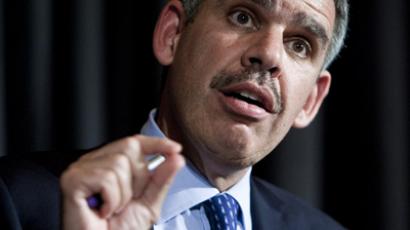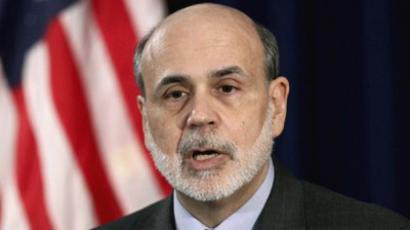After disastrous US job report, QE3 expected next week

The percentage of able-bodied Americans searching for jobs has hit a 30-year-low, and Wall Street now expects the US Federal Reserve to announce a new round of quantitative easing as early as next week.
The US Labor Department released their workforce statistics for August 2012 on Friday, and the figures are far from what economists had expected.The Labor Department announced this week that while the unemployment rate last month dropped slightly to 8.1 percent, July’s figure was revised to show that fewer jobs, in fact, were added that month. For August, the US economy added 96,000 new jobs, a substantially smaller figure than predicted. The median statistic that Bloomberg found after surveying nearly 100 economists came to 130,000 new jobs.Additionally, the participation rate — the labor force as a percent of the population as a whole — charted at 63.5 percent, the lowest figure the country has seen since September 1981.House of Representatives Speaker John Boehner was quick to come down on the Obama White House over the latest news, releasing a statement on Friday that attacks US President Barack Obama and his “failed promises to get our economy moving again.”"Wages are stagnant, gas prices and health care costs are up, our national debt has surpassed $16 trillion and millions of Americans remain out of work or underemployed,” Speaker Boehner said, only hours after President Obama accepted the Democratic Party’s nomination to run for reelection.“I’m very concerned about those of us who are unemployed and where are we going to find stable employment,” would-be worker Kimberly Hackler of White, Georgia tells Bloomberg. Hackler says she has been looking for work since November, applying for close to 200 positions in the last year but coming up empty handed after each try.“I don’t see the economy improving anytime soon. I am concerned it could get worse,” Hackler says.Some economists expect the same outcome, in fact, and predict that the Federal Reserve may now finally step up to the plate. According to them, now is the perfect time for the US central bank to start third round of quantitative easing, or QE3, to address America’s economic woes.In a statement made early Friday, Goldman Sachs tells reporters that they expect the Fed to announce plans for QE3 during an already scheduled meeting next week among the Federal Open Market Committee, more than a year ahead of when they had originally anticipated the maneuver.“With today’s August employment report showing a nonfarm payroll gain of 96,000 and an unemployment rate of 8.1% because of a drop in the participation rate, we expect a return to unsterilized and probably open-ended asset purchases at the September 12-13 FOMC meeting,” the bankers write.“We now anticipate that the FOMC will announce a return to unsterilized asset purchases (QE3), mainly agency mortgage-backed securities but potentially including Treasury securities, at its September 12-13 FOMC meeting. We previously forecasted QE3 in December or early 2013. We continue to expect a lengthening of the FOMC’s forward guidance for the first hike in the funds rate from “late 2014” to mid-2015 or beyond,” Goldman adds.Joseph Trevisani, chief market strategist at Worldwide Markets in, New Jersey, says to Reuters, "This weak employment report, in jobs, wages, hours worked and participation is probably the last piece the Fed needs before launching another round of quantitative easing next week.”Last month, Federal Reserve Chairman Ben Bernanke told an audience at his annual Jackson Hole address, "The stagnation of the labor market in particular is a grave concern not only because of the enormous suffering and waste of human talent it entails, but also because persistently high levels of unemployment will wreak structural damage on our economy that could last for many years.” The Fed has been thought to be preparing a round of quantitative easing for the last year amid dire employment levels, but the Labor Department’s latest news may have finally pushed them over the edge.














